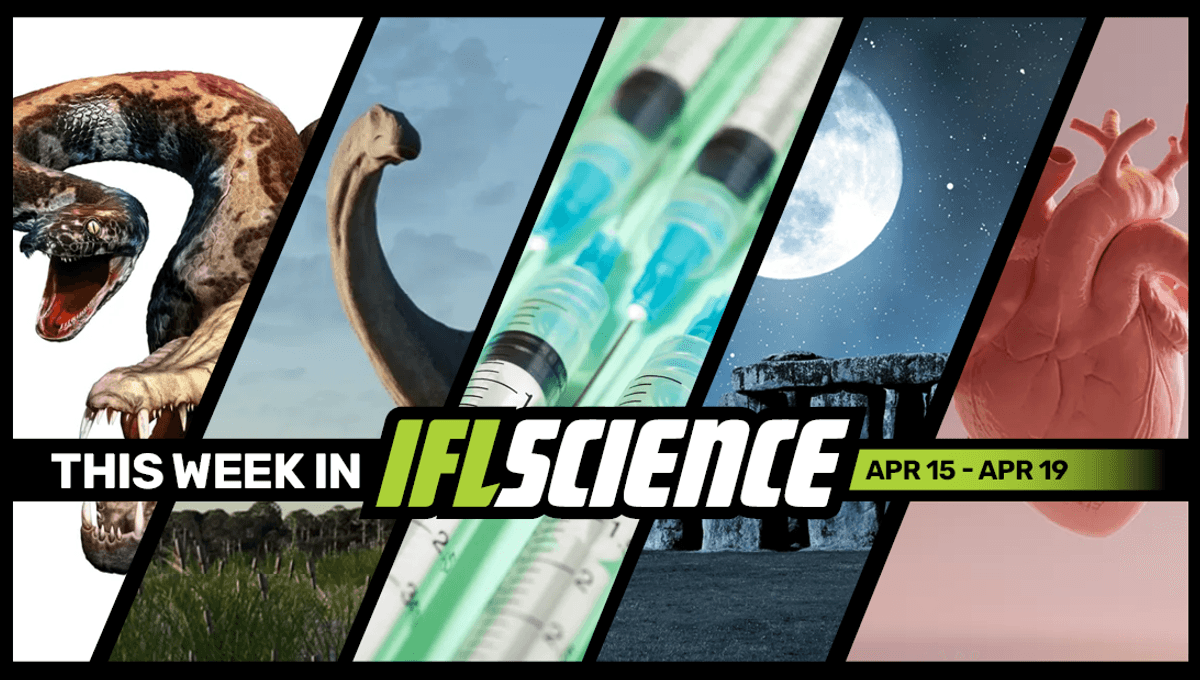
This week, a physicist studying the SARS-CoV-2 virus believes he’s found evidence that we’re living in a simulation, a newly discovered species of titanosaur is one of the smallest ever found, Stonehenge may be aligned to a rare lunar event, and a donor heart successfully makes it nearly 7,000 kilometers across the Atlantic for the first time. Finally, we explore why the philosophy of science matters.
Subscribe to the IFLScience newsletter for all the biggest science news delivered straight to your inbox every Wednesday and Saturday.
New Species Of Prehistoric Snake May Be Largest To Have Ever Slithered The Earth
A new species of prehistoric snake may be one of the largest snakes to have ever slithered the Earth. With an estimated body length of up to 15 meters (over 49 feet), the extinct species might even rival the size of Titanoboa, the current title holder of the world’s largest-ever snake. The newly discovered snake, a member of the extinct Madtsoiidae snake family, lived in the Indian subcontinent around 47 million years ago and has been named Vasuki indicus. Read the full story here
Physicist Studying SARS-CoV-2 Virus Believes He Has Found Hints We Are Living In A Simulation
A physicist studying mutations of the SARS-CoV-2 virus claims to have found evidence for a new law of physics termed the “second law of Infodynamics”, and that it could indicate we are living in a simulated universe. On top of that, he suggests the study appears to imply that the theory of evolution is incorrect, with mutations not being entirely random. Read the full story here
Anyone For A Mini Titanosaur? New Species Is One Of The Smallest Ever Found
A new species of titanosaur has been described from Argentina. Found in rocks dating back almost 70 million years, the mini job has been named Titanomachya gimenezi and was 10 times smaller than its largest titanosaur relatives, making it one of the smallest ever described. Read the full story here
Vaccine Breakthrough Could Mean Future-Proof Shots With No Need For Boosters
A new vaccine platform could see us waving goodbye to boosters for some diseases, as one shot could cover every possible future strain of a virus. So far, it’s only been tested out in mice, but the scientists behind it are optimistic. The vaccine uses a live, attenuated version of the virus. While lots of existing vaccines use a similar method, the new vaccines will not rely on the body’s immune system mounting a response to the injected virus. Read the full story here
Stonehenge May Be Aligned To This Rare Lunar Event – And Scientists Can Soon Test It Out
Stonehenge is famously aligned with the sunrise on the summer solstice and sunset on the winter solstice, yet archaeologists suspect that the Neolithic monument may also have been designed to capture the lunistices, otherwise known as lunar standstills. In particular, the major lunar standstill – which is next due to occur in January 2025, allowing scientists to investigate – seems to have had an influence over the layout of the iconic ancient landmark. Read the full story here
World-First As Donor Heart Travels Nearly 7,000 Kilometers Across Atlantic For Successful Transplant
For the first time, a donated heart has been flown 12 hours and 6,750 kilometers (4,194 miles) across the Atlantic Ocean and successfully transplanted into its recipient. The donor heart came from a 48-year-old man in the French West Indies who had a stroke and, three days later, was declared brain dead. After a routine procedure to collect the heart, it was transported via a commercial airline to Paris, France, marking the first time a donated heart has flown across the Atlantic. Read the full story here
TWIS is published weekly on our Linkedin page, join us there for even more content.
Feature of the week:
Why The Philosophy Of Science Matters
In recent years, there has been a shift in the public perception of science. The COVID-19 pandemic brought with it a modest but noticeable increase in mistrust of scientists and science as an institution, especially in the US. According to a new editorial, the issue may relate to the public understanding of the philosophy of science, an understanding that scientists often take for granted. Read the full story here
More content:
Have you seen our e-magazine, CURIOUS? Issue 21 April 2024 is out now. Check it out for exclusive interviews, book excerpts, long reads, and more.
PLUS, the entire season 3 of IFLScience’s The Big Questions Podcast is available now.
Source Link: Newly Discovered Prehistoric Snake May Be Largest To Ever Exist, Vaccine Breakthrough Could Mean Future-Proof Shots, And Much More This Week